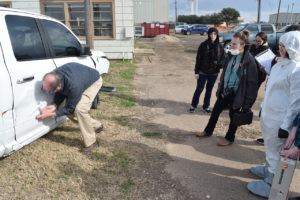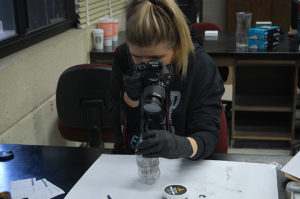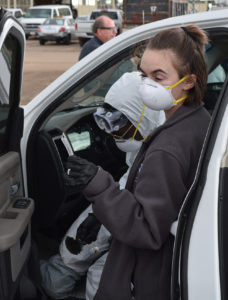
Scott Kovar teaching students about collecting evidence from automobile accident scenes. Photos by Rob Williams
A small group of Forensic and Investigative Sciences students got a chance to test out a revamped Forensics 421 class this January as the Department of Entomology changed the format of the course for 2018.
This year, there were several new additions, including a new faculty member, as well as improved hands-on demonstrations and activities for the students to learn the same crime scene investigation techniques that law enforcement officials and forensic scientists use on a daily basis.
Some of the newer activities students learned included working with inside and outside evidence collection, lifting and photographing fingerprints from different substrates, and how to prepare collected evidence for presentation in court.

Kylee Morrison taking photographs of fingerprints from a piece of evidence
The students also took a trip to the Texas A&M Transportation Institute’s Proving Grounds to learn how to collect evidence from crash scenes during a mock crash investigation. They learned how to collect and preserve paint chips from damaged vehicles, photographing damaged vehicles, and processing fingerprints from vehicles.
During the final day, students presented their evidence to the group in mock court sessions. During the session, the students had to prove their cases while being “cross-examined” by the instructor.
Instructor Scott Kovar enjoyed teaching the first class and said that the skills the students have learned will help them in the future careers.

Tammy Star and Kejaun Tate working a mock accident scene. Photo by Rob Williams.
“I believe it is extremely important to have hands-on experience, especially when it comes to crime scene investigations. In the real world, you might only get one chance to recover crucial evidence at a crime scene,” Kovar said. “You need to be proficient in the proper methodology and be experienced in the application of these techniques. When it’s time to release a scene, our students can be confident that their investigative team has completed their tasks both efficiently and in a professional manner.”
Junior FIVS major Fatimah Bouderdaben enjoyed the class and said that it definitely would help her in her future career. “The class is great and there’s so much to do,” she said. “I like the practicals.”
Bouderdaben is planning on going to grad school and plans to become a forensic anthropologist in the future. She said her favorite part of the week was working with the latent fingerprint activities.
“The fingerprinting practicals are great and it can be applied to what I want to do,” Bouderdaben said.
Junior Bailey Dunn enjoyed learning about the legal side of crime scene investigations and forensic science and Kovar’s teaching.
“This class has been helping me to understand what I will be dealing with,” she said. “Professor Kovar is awesome and I love hearing his stories.”
Forensics program director Dr. Jeff Tomberlin said Kovar was a good fit for the program and the class.
“We are very fortunate to have someone of Scott’s caliber working directly with our students,” he said. “We could not ask for a more experienced and gifted experienced forensics expert to have such a passion for teaching students in the FIVS program.”